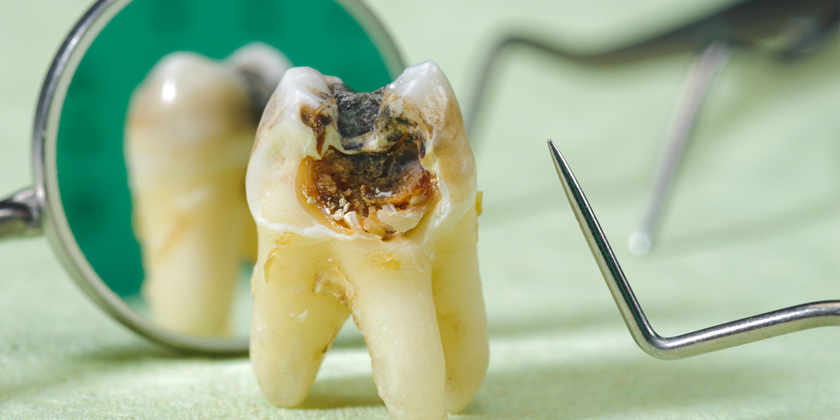Dental caries is a scientific term for tooth cavities or decay. Tooth decay occurs when bacteria, living in the mouth, become acidic. They start eating away at the teeth. Tooth decay if left untreated may cause tooth loss, extreme pain and infection in the gums. Decay is noticed when the enamel starts to get damaged and steadily spreads to deeper layers of the affected tooth and eventually spreads to the pulp. The pulp is the most sensitive part of a tooth since it contains nerves and highly-sensitive blood vessels. To avoid tooth decay, you first have to know what causes this condition. Let’s take a look at the top causes of tooth decay.
Acidic Foods And Drinks
What most people don’t know is that many common foods that are consumed everyday contain acids. Fruit juice and carbonated drinks such as soda all contain acidic agents which cause tooth decay. Additionally, foods like bread and fish contain acid too. After consuming such kinds of food and drinks, the acid immediately start to damage the enamel unlike bacteria which has to feed off sugary foods then coat the teeth in acid.
Sugary Foods
Mouth bacteria thrive off sugary foods. Bacteria feed off the sugary foods in your mouth and produce damaging acid that coats the teeth. This process can take place within a few seconds after taking a meal or it can happen several times over the course of the day after taking meals. This is why dentists recommend brushing your teeth after each meal to eliminate the acid formed. When you hear sugary foods you are most likely thinking of sweets and candy. The truth is that there are many foods that contain hidden sugars. It is important to check out the ingredients in foods, especially processed food, to avoid buying products that have high sugar content.
Enamel Issues And Deep Tooth Crevices
People with deep crevices in their teeth and enamel issues are more prone to tooth decay. Deep crevices allow plaque and bacteria easy access to grow. An individual with deep tooth crevices is advised to visit a dentist and have sealants applied. This procedure is only recommended for people who have infected teeth to help prevent tooth cavities.
Poor Oral Hygiene Practices
To maintain good oral hygiene, one should brush their teeth, floss and brush the tongue regularly and also use a mouthwash after brushing. It is recommended to brush your teeth after every meal, but if this is not possible, you should brush at least twice a day; morning and evening. Take time to brush your teeth by spending at least two minutes. Poor oral hygiene practices ultimately lead to tooth cavities.
Dry Mouth Issues
The presence of saliva on the mouth helps to inhibit the growth of plaque. People with dry mouths are more likely to have dental issues due to lack of enough saliva in the mouth. Dry mouth may be caused by medical conditions such as Diabetes, prescription medications or may be generic. If you have a dry mouth, it is best to work closely with a professional dentist to prevent tooth decay due to dry mouth issues.


